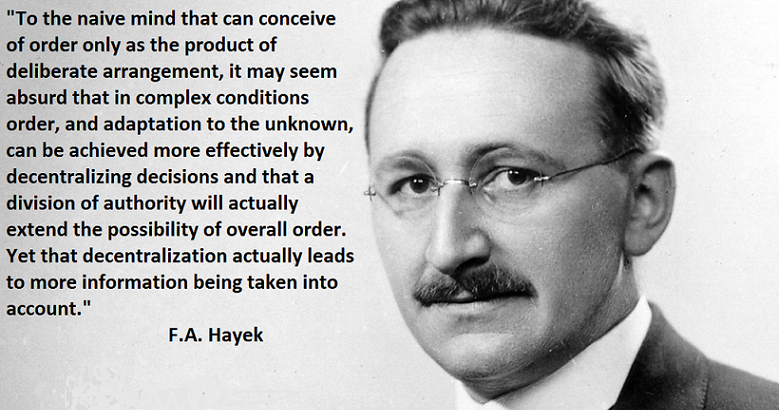"The Road to Serfdom" is one of many neglected classics at the left-wing universities in Sweden, and probably elsewhere. In the humanities, it's common that Hayek is presented as a vicious neo-liberal. Obviously the central planners and the political class responsible for the curriculum aren't interested in free markets based on voluntary exchange or Austrian economics, since these fixers and regulators wouldn't benefit from it.

Hayek's reflections provides an excellent tool for the readers that want to analyze current political events. The book, which was published for the first time in 1944, at the height of the war, was written to show how planned socialism inevitably evolve towards dictatorship and how the mechanisms of oppression takes root in the belief that the complexity of the whole society can be covered and maintained in a single organizational effort, conducted by a number of particularly suited planners. His argument for the importance of the price mechanism for the organization of society through free markets is hard to escape. Prices play an essential role in the economy, transmitting information that allows the participants on the market to coordinate their plans. Something that is heavily distorted by interventions and central planning.
The bust in 1929 was predicted by the Austrian economists. But president Roosevelt, still cherished by socialists and liberals today, was a fixer, and a fixer is not content by passively allowing things to work out the natural way - a fixer has a need for control - he is a control freak. The New Deal was the hope that would solve everything for everyone. Salaries were fixed, prices were fixed, everything was fixed, which only meant that the problems worsened and were prolonged since the natural adjustment process was circumvented by a jumble of counterproductive actions. The Second World War came as a salvation. Yes, keynsians and central planners love war and natural disasters. Through war and mobilization, property and production can be confiscated on a large scale to feed soldiers and build heavy machinery. Sending conscripts to war is obviously also a nice way to mask unemployment. Problem solved.
In "The Road to Serfdom" Hayek strove to highlight the presumptuousness of socialism. The book's status as a 'classic' indicates that he was most successful and that he did it in a way that aroused both anger and admiration. Many felt that Hayek definitely crossed a limit when he showed how Fascism and National Socialism were not opposites, but natural consequences of the socialist ideas of how society should be governed. Even today it's likely that Hayek's description of the crimes of National Socialism as part of the development of socialism is highly controversial.
With regards to democracy and the perception of democratic values, Hayek notes that planned socialism always will reach a point where the need to control society, control the economy and allocate resources creates great friction in the intended social machine. The desires and freedom of individuals, as well as their democratic rights, become obstacles to the implementation of the overall plan for the benefit of society, that the socialist compulsory planner is convinced must be carried out for the public good.

In a particular section Hayek deals with the question of the dissolvement of democracy in the acid of socialism, and connects his reasoning with Adam Smith's observation that those who think they can control a society and its economy have to concentrate so much power in a few individuals that it's impossible to be done without the risk that democracy is threatened. This concentration of power, Hayek claims, is never an openly declared goal of the socialist movement. It's when a politician claims to uphold and protect the "general good" and when they hide behind seemingly harmless goals that the danger lurks: soon enough the socialist benevolence leads to the dissolvement of the democratic process - simply because it's not possible to control and plan a society in enough detail with democratic instruments. The elitist phase of Leninism is thus not a perversion of socialism but a necessary consequence of the same, and also an end point rather than a passing phase.
But Hayek doesn't uncritically embrace democracy. He believes that the values of democracy must never be used to undermine or attack individual freedom. Democracy can never be a goal in itself. In contrast, Hayek believes that the socialist planner argue the opposite: that democratic values must never prevent the suspension of individual freedom when the arbitrary social objectives - as defined by the central planners - is threatened.
Hayek notes that socialism not only lead to the dissolvement of democracy, but also an often overly pragmatic approach to truth. In the chapter "The End of Truth" Hayek explores the instrumental relationship between socialism and "truth". Truth is something that is determined by those in power, something that everyone must believe in to make sure that the organized efforts are uniform: the truth must be adapted to the needs of the planners.
Hayek also examines the relationship between morality and coercion, and states that it's not possible to be praised for something you were forced to do. "A movement whose main promise is the relief from responsibility cannot but be antimoral in its effect, however lofty the ideals to which it owes its birth," he writes.
Essential reading then, and still highly relevant.
